|
Practicing acupuncture for 35 years, I must say Acupuncture Works! Not only can I make a living by doing it, but keep my family healthy with a few needles. My eight year old son has not had to taste a bit of conventional medicine such as fever relievers, antibiotics, etc. He doesn't necessarily like needles, however, when it comes to treating a cold or allergy or even ear infections, he would gladly take a few needles. Nothing fancy or complicated! Just a few fine needles! It works every time we try acupuncture.
0 Comments
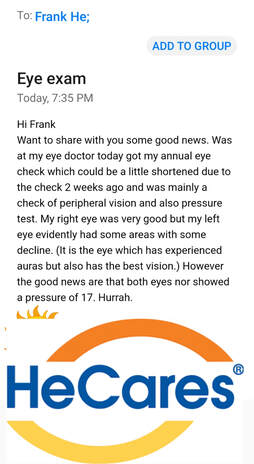 It seems there were only one health issue or medical emergency in the world now-COVID-19! I feel bad for those who suffer from other medical conditions including cancers, pains, skin ulcers, morning sickness, etc. Most of them were "seen" via high tech virtual medical office visit, in front of two screens! Ms. G is one of them who suffers from glaucoma for years. She has been receiving acupuncture to control her intraocular pressure, IOP over the past few years until pandemic hit her life. Her residency complex was locked down between March and July 2020. Her eye pressure gradually jumped above 21 in both sides. Her eye doctor recommended she continue acupuncture to see whether it can do the magic again. She resumed biweekly acupuncture treatment at the end of July and noticed some improved at the end of September. Treatments continued and she had an annual eye exam yesterday. To her surprise, her IOP dropped down to 17 in both eyes. She is not alone, there were two other patients with glaucoma reported to me that their IOPs have been normal for the last 15 years with regular acupuncture treatments. Frank He, L. Ac., QME, DAOM A patient with skin burn that turned into an infection called for an urgent care visit. He was afraid of going to ER or hospital because of the fear of COVID infection and high medical cost. The ulcer healed within five days of the initial visit. Seeing is believing! 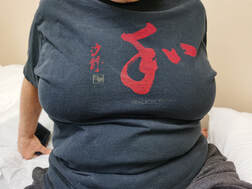 I had the pleasure and honor to treat a patient with neuropathy induced by radio- and chemotherapy. Her story and experience of fighting cancer is worth sharing with many more who are going through the similar battles. I am grateful for her kindness and openness. Frank He, L. Ac., QME, DAOM Thank you for inviting me to speak to you today. This is quite an honor and I hope relating my experiences and insights will help you help your patients move through this process a bit more easily. I'm going to give you a short bit of biographical data – yup, the boring part, before talking more specifically about anal cancer, but I promise to keep it as short as possible. I'm 72 years old, was born in MD in 1946 where I lived until 1972 when my husband and I moved to Palo Alto so he could pursue a PhD at Stanford. Found out that I loved CA, but wasn't so crazy about him. Got a divorce, a job in a hippie bookstore and found myself in the middle of the sexual revolution. For those of you too young to remember, here's some background on the 70's – It was a very free wheeling time – we had the pill, Roe v Wade, penicillin, no knowledge of AIDS, herpes wasn't on anybody's radar – and in my case, my parents and everybody I knew were 3,000 miles away. For the first time, women were encouraged not only to acknowledge their sexual desires but also to act out on them! So I did. I joined the “stud of the month” club and met a lot of interesting men. I had a bunch of different jobs, worked on the Space Program, worked with seniors, opened a small hypnotherapy practice, tried a lot of different career paths, but like the men in my life, nothing really stuck until relatively recently. Steve and I met about 20 years ago and he's been my rock through all this as well as a fabulous wound care nurse. But now onto the medical chronology: In 2006 my ex-husband got squamous cell throat cancer, probably HPV related, but that was never confirmed. I haven't seen him since 1973 when the divorce was final, so this is barely a blip on my radar. In 2016 I had a routine colonoscopy, my delightful GI doctor (I'm really very fond of him) found a pre-cancerous polyp and a suspicious area in my anus. The biopsy came back completely normal. He suggested a follow up in 3 years. Two years later, my knees had gotten so bad that I could barely walk. I have a lot of metal allergies, but finally found a zirconium knee implant and a surgeon I liked and got the first knee replaced in April, 2018. In December, I had some rectal bleeding, but 3 doctors assured me it was just hemorrhoids. Since I was anxious to get the 2nd knee done in January, I accepted the hemorrhoid diagnosis even though the bleeding was heavier than before and my gut was suspicious that something more serious might be going on. In January of this year, I got the 2nd knee done. I had to wait 3 months after surgery to have any procedures done, and scheduled the follow up colonoscopy for late April. In mid-April I got a check up with my new PCP and she declared that despite extra pounds and a less than optimal diet, I'm extraordinarily healthy. Thursday April 25, I had the colonoscopy – there's an obvious problem and a huge ulcer in the lower rectum or anus; biopsies are taken. Two days later on Saturday I got an email from my GI guy asking me to “please” come in first thing Monday morning rather than a week later as was scheduled. If you want to scare a patient out of their mind, this is a great technique – be sure to use the word please for a particularly terrifying effect. This was the beginning of an incredibly miserable weekend. Knowing there was something bad wrong and not knowing what made me crazy. Monday morning I got the squamous cell anal cancer diagnosis and a referral here to the UCSF anal neoplasia clinic as the absolutely best place to go for anal cancer. Lots of fear and uncertainty which waxed and waned but stayed with me at least until the physical symptoms started taking center stage. Wednesday morning – May 1st, Mayday – met Naomi Jay got more info about anal cancer. Talked about my sexual history and was told that I had no risk factors for anal cancer, but was just unlucky – picked up the wrong strain of HPV and didn't shake it. Found out the Nigro protocol was well established and I could get treated close to home. Actually just a couple of blocks up my street, so that was a huge relief and allowed me to get to all my appointments on my own. This started a month of meeting doctors who would essentially say, “hello, nice to meet you, mind if I stick my hand up your butt?” To which my reply was “no, not at all, everyone else has.” To quote Naomi, my tumor wasn't “small.” Surgery was not recommended, but the protocol of concurrent chemo and radiation should give excellent results. Cure rate of at least 80%. Tumor is at least stage 2, possibly stage 3, very unlikely to be stage 4. I find out that I have a sexually transmitted cancer. A cancer diagnosis is a shock. Having asshole cancer is doubly shocking, and finding out that it was sexually transmitted was shocking and embarrassing. At first I wasn't sure how I was going to handle all this, but I learned early on that my friends will pull me through anything and everything. I chose to go public with my diagnosis and by public, I mean public. I started an email support group that has grown to over 50 people where I talk about what I'm experiencing, how I feel about it, what's working and what's not. Everybody has been incredibly sweet. If they're thinking that I had anal sex with the entire 7th fleet, they're keeping it to themselves and just being supportive. Works for me. I've even told the guys at my local Trader Joe's that I have asshole cancer. Their response? They gave me flowers and always ask how I'm doing every time they see me. Going public was absolutely the best decision I could have made for myself. It might not be right for everyone, but it was right for me. I traded my privacy and dignity for love and support and it's the best trade I've ever made. On Friday, May 3, I met with a specialist I never thought I'd need, a medical oncologist. I have about 80 questions which he answers and this is great. But one of my questions is has he treated anal cancer patients before? He said yes, 25 to 50 cases and all did great. Tilt. I already know this is a rare cancer and what the cure rate is. I understand why he might want to lie to me, undoubtedly so I'll feel confident with his care, but there are other ways to make me feel safe. Letting me know that he's coordinating with UCSF, has access to a more experienced doctor that he can consult with, etc. would have been acceptable even if I were his first anal cancer patient. All his lie did was destroy his credibility. Do not lie to your patients. You may get away with it with some, but these days, there's just too much info readily available, and more and more of us are going to catch on. We scheduled a PET CT scan for May 8th, got good results, but there was a possible hot spot in the throat area. The next day, May 9th, I met my radiation oncologist and found him to be much warmer and more personable than my medical oncologist. He told me he had 4 previous anal cancer patients and I found this believable. He recommended doing a temporary ostomy to avoid the pain of passing stool. I elected not to do this. Just didn't want the possible complications of two abdominal surgeries if I could tough it out. He stared at me for a few seconds and decided I was tough enough to go this route like only one of his previous patients had. This was a good decision for me as I got through it with minimal pain meds. My radiation oncologist opined that the PET CT showed a false positive in the throat area due to swallowing. Helps me relax a little, but I'm still very scared. I'm not sure of the exact timing for much of what happened after that. I got matched with a peer counselor, or butt-buddy as I like to call her in Florida. We're very much alike in a lot of ways and neither of us is afraid to talk about anything. She's a psychoanalyst and coach and I did hypnotherapy for a while, so we had some common ground. The early part of this process was terrifying. I was afraid that any delay might allow the tumor to metastasize and while I was busy with prep work – learning what I could about treatment, shopping for OTC drugs and supplies I thought I might need, I still had plenty of time to drive myself crazy. Judy was fantastic. She validated everything I was feeling, gently reassured me that I would get through this, answered all my questions about her experience, and helped me come to grips with my shame and guilt about having anal cancer. I picked up a nasty strain of HPV that caused this cancer from one of my many sexual partners. I had, on a few occasions, tried anal sex. My behavior exposed me to this danger, but at the time, we were all unaware of the possible consequences, and it was the zeitgeist. A whole lot of people were behaving exactly like I was, so UCSF was basically right, I just got unlucky. Accepting that we are all shaped by our choices, both good and bad, helped me get over the shame of getting a sexually transmitted disease in my ass. I did what I did, had a great time doing it – for the most part anyway – and the chips fell where they fell. C'est la vie. While I trusted my doctors, read the pathology report, saw an image of my cancer on a monitor at UCSF, I still had a tough time getting my head around the fact that I had cancer. I felt fine. I was virtually asymptomatic and yet I was signing up for a long tough road with pain, nausea, mouth sores, hair loss, fatigue and who knew what else. In order to really get a visceral sense of the reality of my disease, I gave myself a digital exam and felt the living cancer tumor. Nothing subtle about it. Felt like hard rubber and it wasn't hard to find. I'm glad I did that. Really helped me get with the program. On May 20th I started chemo and radiation. Dr. Berry wants me to talk to you about the effects of treatment and what I've learned. I was able to keep my mouth sores to a minimum with very frequent (8 to 10 times/day) use of baking soda and salt mouthwash and brushing my teeth after eating. I was using a mint toothpaste that was painful until a nurse friend told me to switch to regular toothpaste – big difference, much, much, better. I bonded with the radiation nurses and techs and seeing the same sweet health care providers daily was incredibly supportive. Getting to pick the music played during treatment was grounding and made me feel like a unique person and not just the daily 1pm appointment. At this point I'm still dealing primarily with the psychological issues so constancy and friendliness are the best medicine. I had sore, painful, and frequent poops – I was passing something acidic through my raw butthole up to 25 times a day. I bought a ton of wash cloths to help clean the area, but found the fabric too thick to get into all the little cracks and crevices. Went to the local fabric store to find some “butt-ugly” fleece that I could cut up into small squares (about 7” on a side) and use more effectively for the job. Perfect choice – just the right thickness, doesn't hold too much water, just enough to clean the area, and the fabric doesn't unravel or do anything weird in the wash. The oncology dietitian had recommended a low fiber diet, so I was surprised by Dr. Berry's suggestion to take Metamucil and now I'm down to about 4 or 5 poops a day. Huge improvement. I had no idea that fiber could both increase and decrease pooping. Thank you so much! Just wish I had known earlier. I had skin burns where the top layer of the skin in my crotch sloughed off. I didn't understand what was happening and wasn't looking in a mirror, so when it felt slimy, I tried to scrub the “slime” off in the shower. A little more info about what losing a layer of skin would feel like or a recommendation to visually inspect myself would have been helpful. I have fatigue – not horrible for the most part, but disconcerting, none the less. Again more of a psychological problem. I now have pain in my legs and gut. I wasn't expecting that and had to read in the book “Cancer Up the Wazoo” that this could be lymph node damage and might take months or longer to resolve or even be permanent. Didn't realize that radiation could put a serious kink in how my lymphatic system works, or that it could affect my bones and ligaments. Not sure if knowing this in advance would have helped or hurt. But now I know to ask about any strange little symptom I notice. Knowing to report everything would have been good. I got excellent advice from the chemo nurses to start on anti nausea drugs immediately after getting my first dose and not wait for nausea symptoms to start. Took both zofran and compazine and had relatively little trouble with nausea. Only threw up twice. After I completed chemo and radiation, I spiked a fever and my blood counts got very low. I spent 6 days in the hospital. This was the right place to be with IV antibiotics, two units of whole blood and a bag of platelets. Told my favorite jokes to dozens of different nurses and once the dietitian suggested chocolate milk shakes with every meal, had a pretty good time there. The on-call oncologist treated me for neutropenia before my levels were officially there, saying that if she didn't do something then, I'd be neutropenic very soon anyway. An excellent call. While in the hospital, the wound care specialist had to scratch her head for how to best treat me. I'm allergic to sulfa drugs and can't tolerate them even topically, and have a lot of metal allergies including zinc which ruled out most topical pain meds. She ended up cleaning the wounds, applying lidocaine, and Cavilon, a No Sting Barrier Film made by 3M. Worked like a charm. The wounds healed up in record time. The only tiny hitch was that the first time she used the film, she sprayed it over areas where I still had a few pubic hairs. Ouch. But a quick shave front and back fixed that problem. The oncology ward nurses were impressed by my cheerful attitude, but I figured that I was going to experience the same physical misery whether I laughed or cried, so chose to laugh. Dr Berry also asked me to talk to you about how the diagnosis of anal cancer has affected me. I never thought I'd get cancer. Didn't think I had the personality for it, so had to re-evaluate who I thought I was. Telling everyone of my illness has shown me how very kind people are and how many friends I really have. I was shocked at how supportive everyone has been and it's been a real gift. As I was undergoing treatment to kill the cancer, I talked to it and thanked it for its gift of showing me how kind people can be, even strangers. I thought of that as cancer's gift and the tumor as the wrapping paper, accepting and loving the gift while throwing away the packaging. Another thing I've been asked to address is whether my providers could have prepared me better or communicated with me better either while giving the original diagnosis or describing treatment. My GI doctor was so sweet and distraught when he told me of the cancer that I found I wanted to comfort him! Every illness or malady I've had prior to cancer has either completely resolved or given me more function and less pain in the case of my new knees, so I was unprepared for the possibility of long term side effects. Probably my doctors mentioned some possibilities, but in my initial shock I think I missed that. Talking to my butt-buddy, I've learned that radiation can continue to change your body, and not in a good way, for years or even decades to come. This scares me a lot as I'm not sure if my leg pain will resolve or be permanent or how my pooper will end up. Will I have decent sphincter control? Pain? Continue pooping 4 or 5 times a day forever? I've been told that you as providers who care for patients at risk for cancer want to know how you can do a better job of caring for patients. The number one thing all of you can do is not to dismiss rectal bleeding or pain as simply hemorrhoids. A quick digital exam when I first complained of rectal bleeding could have picked up my anal cancer months earlier. I just started seeing a pelvic floor physical therapist to get help with vaginal stenosis and sphincter control. Not only will the exercises probably strengthen my pelvic muscles, it helps me feel more in control in that there is something I can do to improve my symptoms. Please be aware of timelines when scheduling treatments. At first my chemo and radiation were scheduled to begin on Wednesday, May 22, which with the 96-hour infusion of 5-FU would have had me finishing on Sunday morning of Memorial Day weekend. I complained and managed to get rescheduled 2 days earlier on Monday the 20th, so I could get rid of the pump on Friday and not have to lug around an empty pump for a couple of extra days. Encourage patients to discuss any changes that they are noticing even if they don't think it's related to treatment. Have honest discussions about what might be going on, and what you can do to ameliorate any problems. Don't be afraid to suggest experimenting with different options. If a low fiber diet isn't working, suggest high fiber. Say you don't know when you don't know. You know a lot, but we don't expect you to know everything. Tell the truth. Cancer or more precisely, cancer treatment, will scar me, both physically and psychically. If I talk about physical problems, explain what you know about what's going on, and give suggestions if you have any. If it's a psychological issue, listen, be present, trust that I can find a way to move forward. Acknowledge that the whole process is hard. Don't be too quick to “fix” it. Just be willing to travel the road with me. Thank you for inviting me to tell my story and hopefully be a positive part of someone else's healing. UCSF Patient Perspective Talk to IANS (International Anal Neoplasia Society) HRA (High Resolution Anoscopy) Course, July 28, 2019 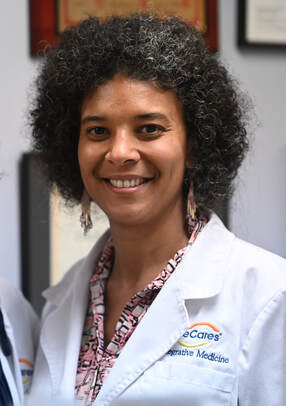 We are three quarters into 2020 and so far it has been a year of total upheaval. According to the Chinese Zodiac we are in the year of the Yang Metal Rat. I propose that we dub it the year of the Monkey Wrench. Any plans one thinks he or she may have, forget it! Here comes a monkey wrench thrown at it! COVID-19 all over the planet--an actual pandemic--soaring unemployment, children at home and those parents still with jobs having to figure out a way to reconcile time parenting with work, old folks being cut off from their communities, families, and support groups for fear of infection, flaring racial tension, publicized police brutality, political and ideological battles, extreme global weather patterns causing fires, floods, earthquakes, hurricanes, tornados, extreme heat waves and extreme cold fronts, suspension of our team sports and many forms of exercise and entertainment, to name some of the big ones. There is probably more one could add to the list if she really tried. Oh, lets not forget smoke exposure and evacuations. What does all of this add up to for us in our everyday life? Well, the bottom line is stress. People are experiencing incredibly high levels of stress right now, which can manifest in many different ways. For some it causes feelings of “panic attacks”—shortness of breath, chest tightness, heart palpitations, etc. For others it may cause headaches, neck pains, whole body pains. For still others it may affect their digestive system, throwing everything off. Could be pain and bloating, constipation, loose stools, indigestion, etc. Or possibly it is affecting sleep, mood, and concentration. These are all ways that individuals may respond to excess stress when he or she is not able to process and transform that stress. The one effect that is not quite as obvious is that sustained high levels of stress also lowers the immune function. This would be extremely bad in a time of a pandemic. So, what can we do about this? If you are experiencing any of these symptoms, you are actually quite normal and are not doomed but it does require some action. Fortunately for us, humans have faced stressful times in the past and have kept great records of it. That knowledge is the heritage of our Traditional Chinese Medicine and what we practice here at HeCares. Over the past 3000 years, humans have had to face even tougher times than we are facing right now and have survived. And, we have learned a lot about how to cope with the challenges facing us. We do no have to do it alone. We have the help of herbs, acupuncture, movements and doctors at HeCares who can help guide you through the proper use of all of these. Right now, we have herbal formulas that can help with the side effects of smoke exposure. We have acupuncture treatments that can help with not only the symptoms of stress but also can help you become more resilient to the on slot of new challenges and actually process stress more effectively. We can help you find ways to stay fit even without the access to your gym. We even have herbal formulas that have been effective against the coronavirus and are beneficial for promoting a stronger immune system. So, how are you going to take care of yourself during these trying times? The answer; come to HeCares for treatment. We are here to help you. We may not be able to stop those wrenches from flying, but we might be able to help you to feel more capable of ducking out of the way! Leia Sutton-Barnes, L. Ac. Staff Acupuncturist 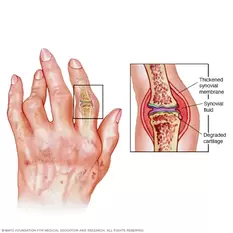 Some patients we wish we had seen them much sooner. I’ve begun treating a 64 year old woman with advanced rheumatoid arthritis. Rheumatoid arthritis is an autoimmune disease where the body’s own immune system begins attacks the joints. In mild cases it can just cause pain and swelling in a few joints, primarily the smaller joints of the hands or feet. In advanced cases, it can deform the joints, causing the hands to change shape. In very advanced cases, it can affect every joint in the body, along with many internal organs. Unfortunately, this woman’s case was very advanced. It had impacted almost every joint in her body, requiring 13 surgeries. All of the joints in her hands and feet had been removed, both her knees had been replaced, several vertebrae in her neck and back had been fused, and surgeons were recommending hip replacements as well, after she broke both hips. Last October she fell and broke her left hip Then while recovering in the hospital, she had a heart attack, fell, and broke her right hip. After recovering, she had started physical therapy twice a week, but was recovering slowly, and required a cane or walker to get around. Fortunately, her physical therapist referred her to us. In just two treatments she was in much less pain and walking more freely. She was impressed that two acupuncture treatments had made her feel better than months of PT, and wished she had started sooner. Now she has hope that she may be able to recover without requiring hip replacement surgery. I wish she had started sooner too. I can only imagine how much pain and surgery we might have spared her, if she had started treatments at the beginning stages of her disease, instead of waiting until she was so advanced. We might have been able to spare her years of pain, surgery, and debilitation. Unfortunately, too often in the West, acupuncture is often the treatment of last resort, patients turn to us when nothing else works. But at HeCares, we hope to establish that acupuncture and Chinese medicine as the treatment of first resort. We may be able to spare her from getting two more surgeries on her hips. We only wish we had been able to prevent the other 13. David Dick, L. Ac., DAOM If you build it, they will come.
If they can't, we will go to them. Introducing HeCares Mobile Care. Since we put this van on the road two weeks ago, it has been in high demand. Medicine can sound like a detective story sometimes, you have to find the one detail or figured out what changed to make an event happen.
I’ve been treating a 95 year old woman with Alzheimer’s. In the past, she’s depended on her daughter to take care of her and manage her affairs as she drifts more and more into an endless present. However, with the Shutdown orders during the Covid pandemic, she was suddenly forced to take more responsibility for her daily tasks. This was a struggle for her, as she would often set things down, then forget where she had placed them, one time searching for her posture brace for several minutes before realizing she was wearing it! I started her on a standard formula for memory (gui pi tang), and she seemed to improve. She had more focus, and could manage her daily tasks on her own, she even began teaching herself to use a smartphone! However, amidst the pandemic, we had difficulty getting the same brand of herbs for her, so we substituted the same formula from a different brand. The difference was immediate. Suddenly, and quite dramatically, she went back to the way she was. She would forget not only to do her tasks, but where her tasks were written. This was frustrating, and disappointing for both her and her daughter, especially since she had recently been so much better. So, I had to get to the root of the problem. And well, the root of the problem turned out to in fact be a root. The two formulas were identical in their composition, and 11 of the 12 herbs were exactly the same. But what about that one herb difference? The first brand had used Ren shen (Panax ginseng), while the replacement used a cheaper substitute Dang shen (Codonopsis pilosulae). Since everything else was the same, I deduced that this was the key that had resulted, first in her improvement, then in her decline. I had the daughter get her mother some ginseng tablets, and sure enough, she started to get better again. When the order for the original formula finally arrived, she improved a little more. Herbs haven’t been a miracle, but they do allow her to manage her daily affairs, and take some of the burden off her daughter. Sometimes improvements in medicine come from a combination of many factors working together, but sometimes, a single herb can make all the difference! David Dick, L. Ac., DAOM Covid-19 has changed the daily routine for many people, I would say probably most of us, and while it is quite challenging in many ways, there are some gifts to be found in the new opportunities being presented. One of them is to establish good eating habits. With much less access to restaurants, we have the opportunity to embrace the abundance of beautiful local food produced right here in our area. And, as many suddenly had the time to plant gardens, now Covid-19 is giving us the time to cook wonderful dishes with the fresh vegetables. We are being given the opportunity to enjoy the fruits of our labor and feed ourselves well. Even if you did not make a garden, it is still possible to jump on the bandwagon of cooking your own fresh food using locally grown ingredients. We are blessed to live in a major agricultural area. Helping people increase their health and wellness are my main goals. The first line in great health is to eat great food. It may be cliché to say “you are what you eat” but isn’t it really true? If we eat junk, we feel like junk. If we eat vibrant food full of energy, we are more vibrant and energized. Just like the fuel we put in our cars, if the fuel isn’t clean, the car is not going to run well. We need to give our body the building blocks necessary for not only daily functioning but also for repair and for strength to protect us from invading pathogens. A healthy immune system depends on proper nutrition, which is essential right now. The best way to get that nutrition is to eat a variety of fresh plants, fruits, fish and meats, all of which we are lucky enough to have access to in this area. Summer is the season where fresh fruits and vegetables are in abundance and we have a large assortment of them produced locally. Many of you might even have put in a garden during the shelter-in-place order. Hopefully, you are reaping the benefits of your labor of love. That love can be tasted in the food you eat. The vitality of our food supports the vitality of our body, mind and spirit. All are dependent on what and how we eat. (If you need ideas on how to use all your zucchini and tomatoes, come talk to me!) So, we understand why to eat fresh food. What is the freshest we can get? Well, from our own garden of course. If you don’t have a garden, fret not, get a CSA box (Community Supported Agriculture box). Local farms prepare boxes at regular time intervals, usually weekly, for us to buy. The ingredients in the boxes change from week to week, being filled with the food that is most ripe and abundant in that moment. Hence, we eat with the season. By eating with the seasons, we are in harmony with the rhythms of the world--following the Dao--and are helping our system function more optimally thereby strengthening our immune system. It is imperative that we do what we can to stay healthy such as exercise regularly, sleep well, get acupuncture, get massage (even if it is from yourself), and eat well. Now, eating well is going to vary from person to person (I am also happy to help you figure what that is for you), but you really can’t go wrong with eating what is fresh: in season and local. By eating from food produced locally, we are also reducing the need for as much travel all along the food chain (or the production chain anyway). Many farms deliver or have pick up locations, which also helps to reduce the excess exposure of going to large markets. Less travel equals more time to cook these fabulous foods. Many meals can be made simply and quickly. When products are so fresh, long cooking is not necessary, unless you enjoy getting fancy with elaborate recipes. We can revive the “slow food” revolution and feel like we are gaining more time because it is time spent on self care. We are nourishing ourselves and our families. We are nourishing our local communities and we are nourishing the planet. With this we become stronger and things like pandemics have less fertile ground in which to flourish. So lets stay vital with immune boosting acupuncture, and nutritious fresh food. An ounce of prevention is worth a pound of cure. By Leia Sutton-Barnes, L.Ac A 20 year old college student went to a local urgent care clinic with severe back pain and numbness going down into his thigh. In the Before Times, he had taken regular walks in between his studies. However, since the Shelter in place, he had stopped walking and spending most of his time in doors, studying on a computer with bad posture. Then, a few weeks ago, he went to sit in his chair, and his back spasmed. At first he started stretching and took some painkillers, but it got progressively worse over the following weeks. He also started having burning nerve pain down into his thighs.
Finally, out of desperation for relief, he went to a local urgent care. Unfortunately, they had nothing to offer him. He wasn’t severe enough for stronger medicines like cortisone injection or surgery, and the other alternatives they had to offer - heat, stretching, over-the-counter painkillers - he had already tried without success. Fortunately, they sent him to us for Hurgent Care. A quick examination (straight leg raise) showed he did have mild sciatica, but at his age he should have recovered faster. He likely got caught in a cycle of inflammation from his lack of usual activities, that built up over time until it became too painful. But improving circulation and reducing inflammation is what acupuncture does best. A needle behind his knee (UB 40) relieved the pain in his lower back (L4 Jia ji), a needle in his mid-calf (UB 57) relieved the pain in his sacrum (UB 54), and a point on the side of his calf (GB 34) relieved his hip pain (GB 30). A few more points to promote circulation and reduce pain, and I was ready to let him rest. At first he was worried he wouldn’t be able to lay down for the full 30 minutes without his back starting to hurt. I checked on him after 10 minutes, and he said he had relaxed enough he was now fine, and I could try again in 10 minutes. When I checked again after 20 minutes, he had fallen asleep! At the start of his treatment, this 20 year old had had to crawl onto the bed like an old man, after the treatment he leaped off like a young, healthy man should. After just this one treatment, he was out of pain. The shelter in place is putting a toll on all of use. Be sure that you wear a mask, wash your hands, and clean surfaces regularly. Also make sure that you take care of yourself and your body. Continue to get regular exercise, eat well, and stretch regularly, especially if you do a lot of computer work. But if things do go wrong, we are here to help, for regular office visits, and Hurgent care. Hurgent Care is now mobile! We now have a dedicated Sprinter van that can treat you anywhere, at your office, home, sports field, or anywhere else you need us! For non-life threatening emergencies, instead of Urgent Care, think of Hurgent care, we can give you better options, at a fraction of the price. David Dick, L. Ac., DAOM |
AuthorsAcupuncture Specialists at Integrative Medicine Center Archives
April 2023
Categories
All
|

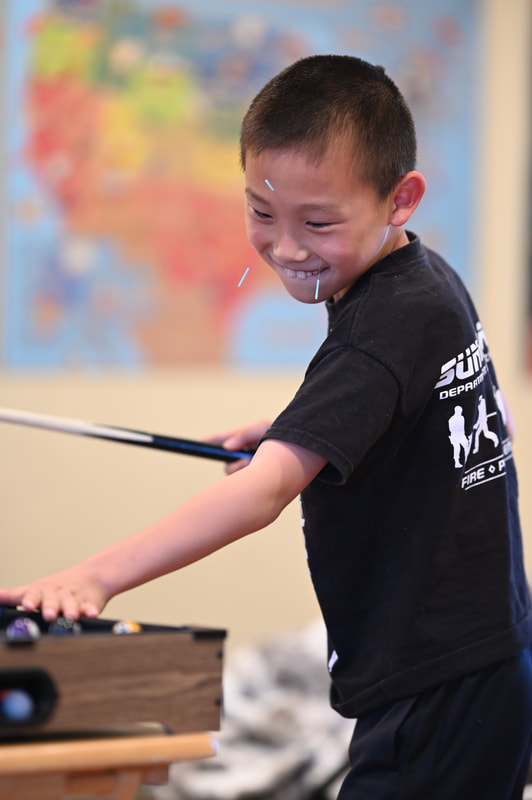
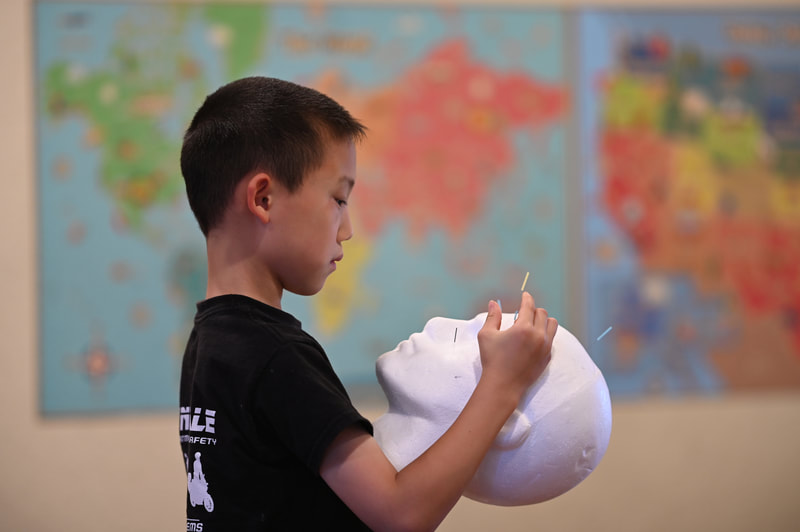
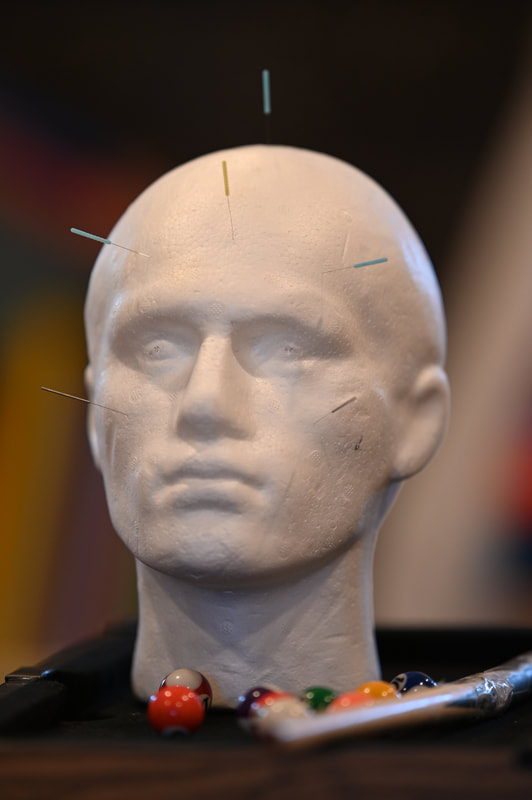
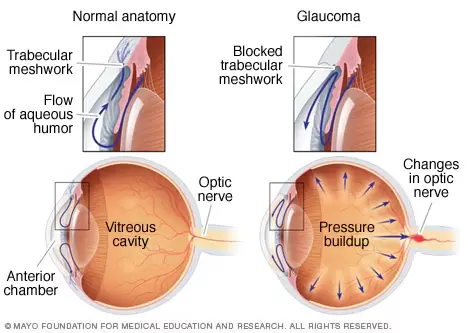
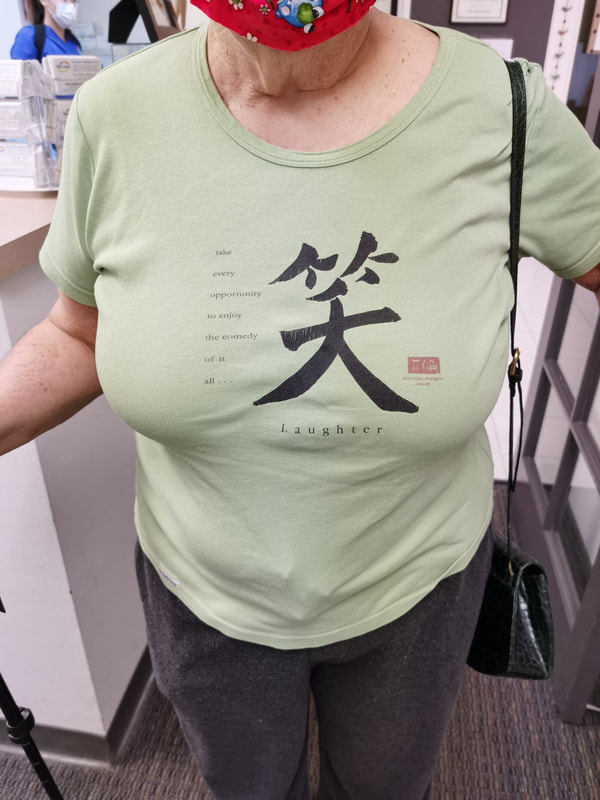
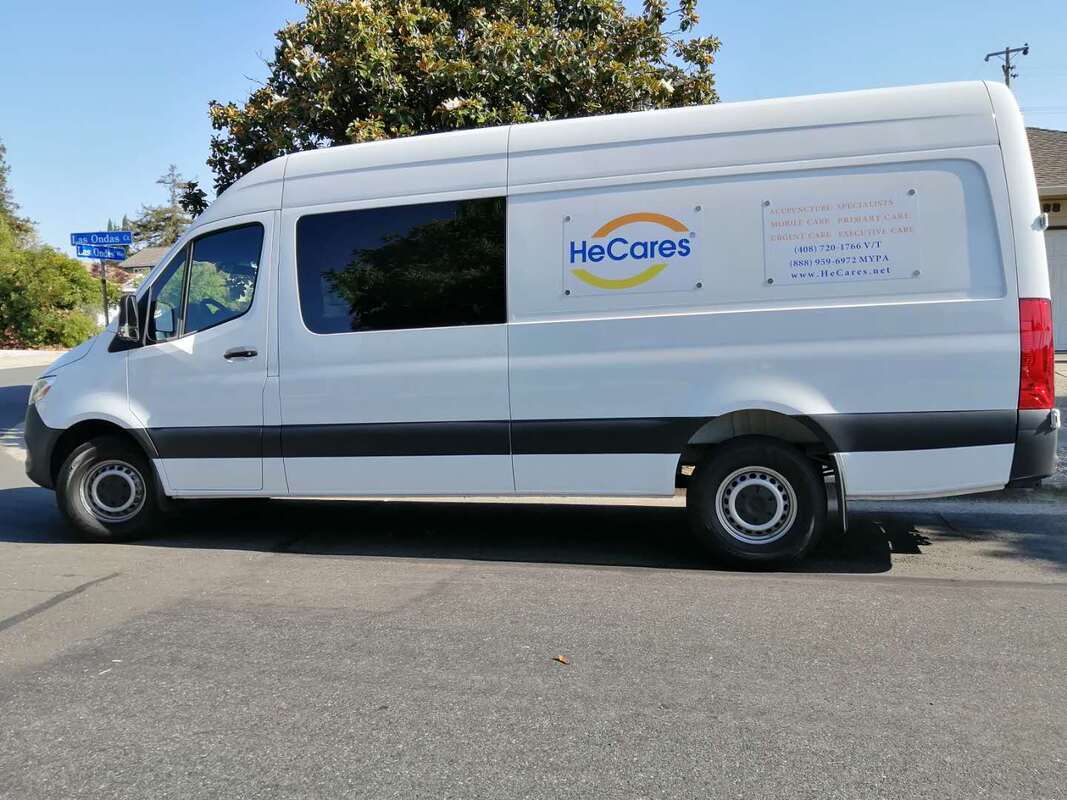
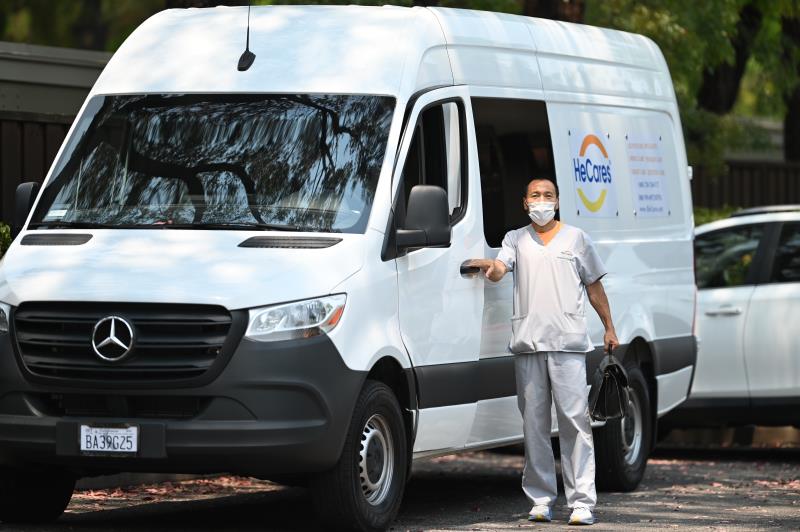
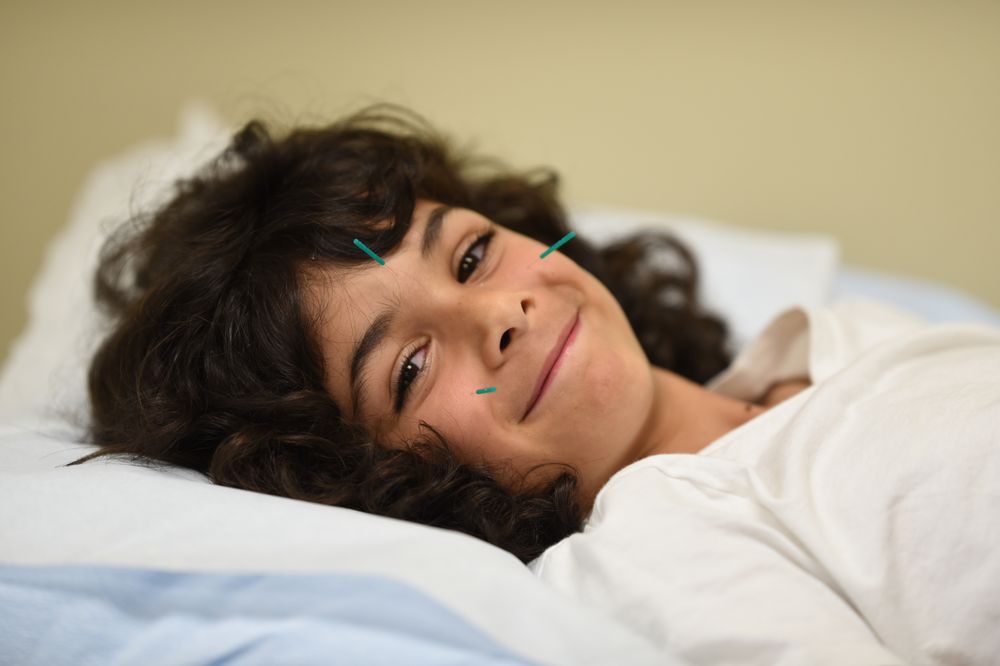
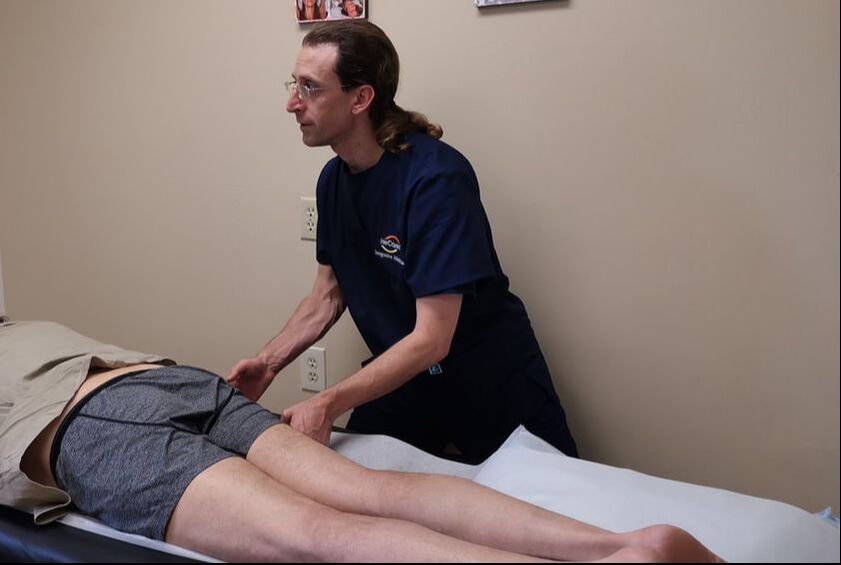
 RSS Feed
RSS Feed